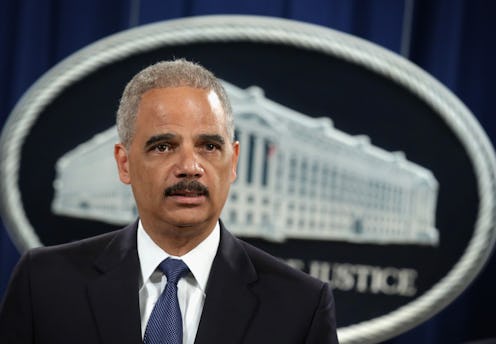News
Why America's Lawsuit Against China Won't Work
A first-of-its-kind event happened Monday: The U.S. government charged five Chinese military officials with hacking into private American companies and attempting to steal industry secrets, particularly those about nuclear and solar power. Attorney General Eric Holder deemed the hacking "economic espionage," and the Department of Justice launched its first ever lawsuit against employees foreign government for a cyber crime. And while charges have been filed, it is highly unlikely that they will have any effect on the accused perpetrators.
The official charge leveled against Wang Dong, Sun Kailiang, Wen Xinyu, Huang Zhenyu and Gu Chunhui is conspiracy to commit computer fraud and abuse. These five individuals are accused of hacking into various company computer systems and databases to spy on company activity, as well as obtain systems designs, computer information, employee information, as well as other trade secrets and internal documents.
Several companies have been affected, including Westinghouse Electric, US Steel, Alcoa Inc, Allegheny Technologies, SolarWorld and the U.S. Steelworkers Union. According to FBI officials, it is highly likely that more companies and individuals have been affected. Reports suggest that the Chinese government has been engaged in systems hacking since 2006, and these cyberattacks have resulted in "significant losses" to companies. Holder said on Monday that the American government "categorically denounces" these actions, but it seems that denouncement is all the government will be able to do.
Given that the hackers work for the Chinese officials and are, ostensibly, acting under government orders, it is highly unlikely that they will be extradited to the United States to face trials. As John Carlin, the assistant attorney general for nation security said, these hackers work "under the shadow of their country's flag." Holder said that he was hopeful Chinese officials would work with the American government and allow the justice system to prosecute its offenders. But China's Foreign Ministry spokesman Qin Gang called the charges "extremely absurd" in a statement on the the ministry's site, seeming to squash all hopes that China will cooperate in the U.S. attempts at prosecution.
The Chinese government has wasted no time in rebuffing American claims of wrongdoing, and Gang said that the U.S. "has fabricated facts," and furthermore, that China serve as a "staunch defender of cyber security." Gang went on to say that the Chinese government, its military and "associated personnel never engage in any theft of trade secrets."
With U.S.-Sino relations already on rocky ground, these allegations and the Chinese response only further deepens the rift between the competing powers, and diplomatic relations may be in jeopardy as a result of such charges. According to the Chinese Foreign Ministry website, the accusations "severely violate basic norms of international relations, and harm cooperation and mutual trust between China and the United States," and in addition to denying the Chinese government's role in company hacking, the statement also demands that the Justice Department "correct its mistake" and withdraw the charge.
According to the Chinese, it is the Americans who have spying on China, not the other way around. And these accusations are not altogether unfounded. The National Security Agency has been accused of spying on Chinese officials and companies, and following Edward Snowden's leak, The New York Times published an article that exposed NSA surveillance in China.
The U.S. did not deny these allegations, and one Pentagon official, who spoke anonymously to reporters, said,
We want the Chinese to understand what it is we’re doing in building a cyberforce at Cyber Command, understand how we operate, understand the policies we use, like the policy of restraint.
But while the American government hopes for Chinese understanding to justify their own spying, they are not so lenient with foreign governments. Said Gang, China has fallen "victim [to] U.S. cyber surveillance and theft," and "certain U.S. agencies have been consistently tapping into China's government agencies, corporates, universities, and private networks for surveillance purposes."
The Chinese and Americans have been engaged in a cyber-dispute for many years, and its potential dangers appear to be drawing closer and closer. Last year, Hillary Clinton spoke on the issue, saying,
Obviously this can become a very unwelcome and even dangerous tit-for-tat that could be a crescendo of consequences, here at home and around the world, that no one wants to see happen.
Unfortunately for the United States, for now, it does not seem as though the Chinese hackers will face any consequences, much less the 15 year prison sentence that accompanies economic espionage. Without an admission of guilt or a desire to cooperate in an investigation, it would appear that U.S. - Sino relations are, perhaps dangerously, on the decline.
